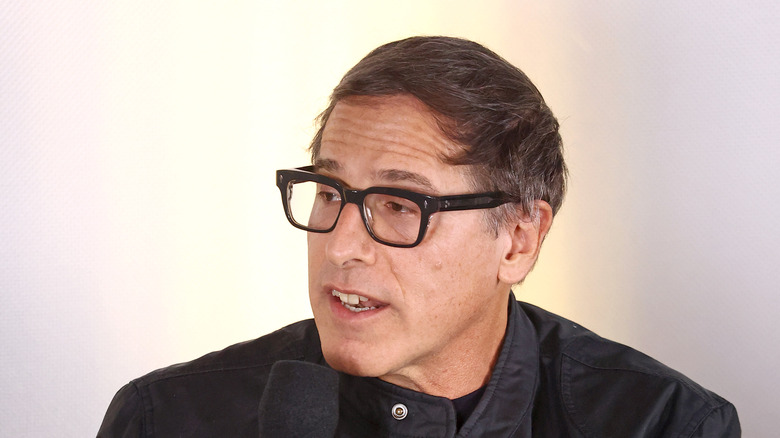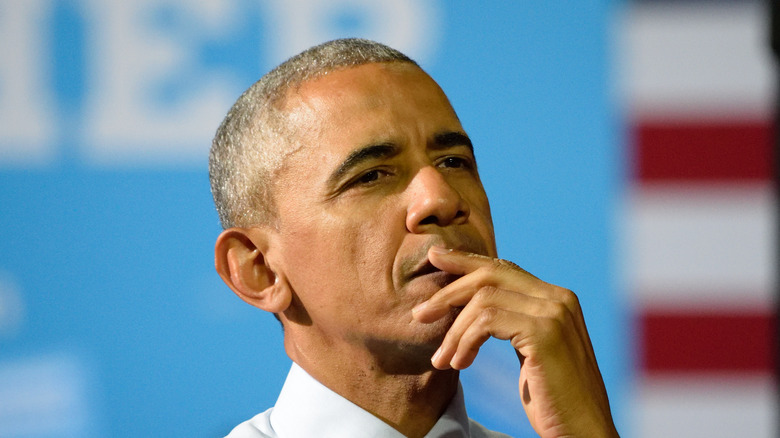Kirstie Alley's Final Theatrical Release Was Unfinished And Hated By Critics
Kirstie Alley has died of cancer at 71, her children True and Lillie Parker announced via Alley's Twitter and other social media pages yesterday. Alley is best known for playing bar manager Rebecca Howe on "Cheers" from 1987 until 1993, having won two Emmy Awards for best lead actress in a comedy series for the role. She also starred alongside John Travolta in three "Look Who's Talking" films.
Alley made her small-screen debut in 1978 in the sci-fi series "Quark" before landing her role on "Cheers." She starred in "Veronica's Closet" from 1997 until 2000, for which she earned another Emmy nomination. But her long and celebrated acting career came to an undistinguished end as her last theatrical film, 2015's "Accidental Love," was plagued by budget issues and abandoned by director David O. Russell before a limited release. It was then heavily criticized, earning the approval of just 8% of critics and 15% of audience members on Rotten Tomatoes. The film was technically never actually completed, and several key actors (not including Alley) left for financial or creative issues.
Russell clashed with James Caan over Caan's character's death scene in the film (via Entertainment Weekly), leading to the veteran actor's departure and his part being recast. It also starred Jake Gyllenhaal, Tracy Morgan, Jessica Biel, Catherine Keener, and James Brolin, some of whom walked out on the film after the studio left some of the cast and crew unpaid during production. The film was originally titled "Nailed," but the name change was just one of many disruptive events during early production.
THe film and its bizarre plot were hammered by critics worldwide
The plot of Kirstie Alley's last theatrical release, "Accidental Love," centers around a roller skating food server named Alice (Jessica Biel), who is accidentally shot in the head with a nail gun, and her bizarre experiences seeking treatment and a normal life afterward. As for the version that made it to theaters, critics had few nice things to say about the film.
Richard Roeper of the Chicago Sun-Times wrote, "The story behind 'Accidental Love' is weirder and definitely more interesting than the movie itself." After detailing the project's many production disasters, he added, "As for the movie: It's an unmitigated disaster, not even worth a spin as a curiosity piece... The satire is broad and forced and unfunny, there's no cadence to the setups and visual punch lines, and the likable cast is hopelessly lost ... Some disasters should remain forgotten." Dan Mecca of The Film Stage called it "About as slipshod as its new title."
The intended message was muddled by juvenile humor and production hiccups
With all of the disruptions during production, it's no surprise that the so-called final product appeared poorly assembled, but the attempted underlying serious message about the lack of affordable health care in the United States was simply buried under crude jokes about sexual and excretory functions. Tracy Morgan plays a man with a prolapsed colon, and he and Biel's character are joined in their efforts to find care by a reverend with a persistent erection (Kurt Fuller).
The sophomoric jokes and ever-present stereotypes take whatever steam was behind the moral of "Accidental Love" out pretty completely and it's left stuck in an uninhabitable zone between serious and slapstick and never finds its way out. James Mottram of The List wrote, "It's not hard to see why Russell washed his hands of the unfinished cut; it would've been better left as the mysterious movie we never saw than the half-baked one we're lumbered with now." Annie Errigo of Empire Magazine minced no words, calling it" The bastard offspring of a charmless romcom and a toothless political satire."
The passage of the Affordable Care Act also made the film's lesson irrelevant
Filming on "Accidental Love" started in 2008. Two years later, the passage of the Affordable Care Act, which completely transformed the healthcare industry in the United States, rendered the film's intended moral thrust irrelevant long before its release. Martyn Conterio of CIneVue wrote, "Even with Russell on board to see his 'madCapra' farce all the way to release day, its whole raison d'etre — as a political knockabout satire — would still have made the film dead on arrival at the box office. What happened? Barack Obama, that's what."
Bilge Ebiri of Vulture called it "Something of a catastrophe" and added, ”Accidental Love' is an utter mess, which is understandable given its troubled provenance. It's also fascinating. We see so little genuine satire on film nowadays — it's always crossbred with something more earnest, like a romance, or a thriller — that watching one suddenly feels like an alien encounter. (Yes, this film has a romance plot in it as well, though it feels largely secondary, despite the foregrounding in the title.) Of course, the film also offers a case study in why cinema has largely ceded satire to television: The flipside of topicality is a reduced shelf-life, and the entire premise of 'Accidental Love' has dated in a post-Obamacare America."
The top-tier cast was wasted on a juvenile script
Prairie Miller of WBAI radio in New York Wrote commented that "Accidental Love" was "A kind of subversive screwball mashup of Hollywood and Occupy Wall Street." They went on to add that the film, which was co-written by former Vice President Al Gore's daughter Kristin Gore and based on her novel "Sammy's Hill," "comes off as a different inconvenient truth."
The stellar cast (James Marsden is also there as Alice's love interest) wasn't enough to save the film, and neither was the combination of crass bodily function and sexual jokes (one of Alice's complications from her injury is inexplicably a runaway libido). Fortunately, Kirstie Alley completed "You Can't Take My Daughter" five years after the debacle that was "Accidental Love." If not for the former film, the latter would have been the last memory we have of a talented, versatile, and accomplished actor.
The long and sad story of "Accidental Love" should serve as a cautionary tale for studio executives, directors, and actors alike to choose their projects carefully. Although the careers of Alley, Biel, James Caan, James Marsden, and Beverly D'Angelo were not tarnished by their appearances in "Accidental Love," the film lives on as a series of lessons for Hollywood on how to produce a disastrous flop.




